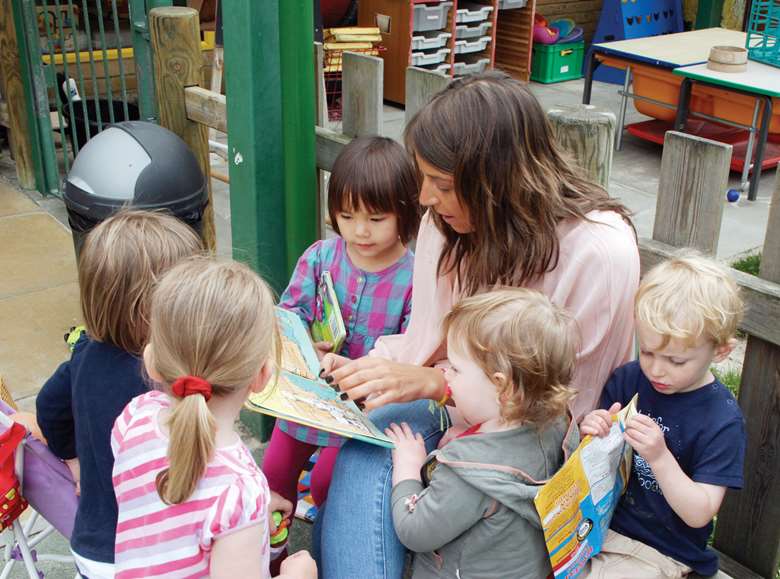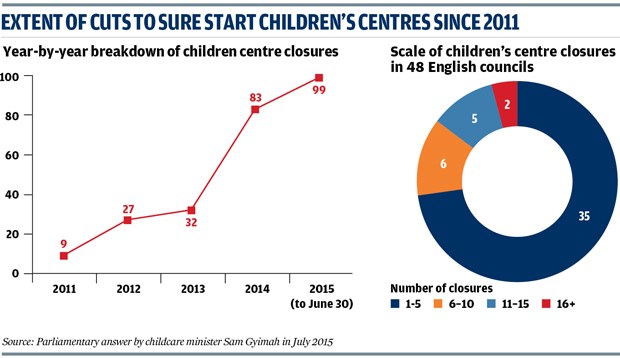Children's centres face uncertain future amid cuts and closures
Derren Hayes
Monday, August 3, 2015
Sure Start children's centres are at a crossroads. With funding cuts forcing many councils to close or downgrade provision and a government review about to be launched, experts set out what the future holds.

The government last month announced it is to hold a review in the autumn on the future role of Sure Start children's centres.
When it comes, the consultation will be set against a backdrop of a growing number of councils closing centres, a dramatic fall in government funding and huge variation in provision across areas (see graphic and in numbers).
Faced with a 56 per cent cut in early intervention grant funding since 2010, many local authorities have been forced to close centres or reorganise their network into a "hub and spoke" system, where some smaller centres provide fewer services, are only open shorter hours or are staffed by volunteers.
The exact scale of these reductions are hotly contested. Figures published last month by childcare minister Sam Gyimah suggested 250 "main" children's centres had closed since 2010, and that the pace of closures was quickening (see graphic).

The figures also show that out of the 3,382 centres that remain open, 705 are classed as "additional" sites.
Sharon Hodgson, shadow children and families minister, says the figures show that many buildings previously registered as children's centres have been "hollowed out".
"We know that over 800 (sites) have been declassified as children's centres," she says. "These centres have little more than caretakers and a bottle of bleach."
The Department for Education says it is up to councils to decide how additional centres are managed as part of their network.
But Hodgson says the government is "trying to put all the blame onto local authorities" for the loss of local provision.
"Councils have done brilliantly to keep many centres going in the face of the 56 per cent cut in the early intervention grant," she adds.
"The minister can slash and burn and then complain about the ashes, but what does he expect with such cuts? Children's centres are not working in the way they were intended.
"It does feel that it (the review) could be a softening up exercise to becoming just a service targeted at the poor or mass closures of centres."
But closures of centres is just one of the issues the review will have to consider. With local government funding set to be squeezed further in the coming years, questions will also need to be asked about whether centres can continue to be open access, if they will need to start charging for some services and the role of charities in delivering provision for councils.
Here, children's services leaders outline what they believe the future holds for children's centres.
Jenny Coles, chair, ADCS families, communities and young people committee:
"It is important for us to recognise the significant contribution of the voluntary sector in delivering children's centres across the country. These centres are playing a key role in their local communities, ensuring children get a better start in life and that families can access support.
But this is about more than buildings and we need flexible services that will help to close the gap in outcomes between the most and least disadvantaged families. In the current financial context ensuring the most vulnerable families are identified and receive professional help must be a priority, while trusting local communities to provide more informal support themselves.
It is the view of our members that local authorities are best placed to oversee local needs and to use the available streams of funding to commission services in each local community.
Although we do have concerns about the sustainability of funding for early intervention more generally, we welcome the transfer of responsibility for funding public health services (health visiting) to local authorities - this provides an opportunity to integrate health, education and social care support which will particularly benefit the most vulnerable children."
James Hempsall, director, Hempsall's consultancy and former children's centre manager:
"Consulting on and clarifying the future of children's centre services is essential, as is honing attention onto the outcomes we want and the best ways of achieving them. Over recent times, we've experienced the reality of local politicians and funding decision-makers losing their nerve and financial clout, being too quick to reduce centres' critical mass and ability to deliver. What we risk now is losing the opportunity to future-proof services for the next 15 years. I argue that children's centres still need to have both targeted and universal interventions. It should always have been more than about bricks and mortar - it's about services and how they are offered and engaged with.
The range of models and actual effectiveness of services varies considerably, and we need to do more to lead and hold centres and their councils to account. Preventative services cannot and should not be expected to deliver the immediate tangible outcomes that intervention can achieve.
Children's centres should be held to account to the original aims of being: non-stigmatising - as access based on stigma can never be a good thing, even if the eventual outcomes are successful; and multi-faceted - targeting a number of factors universally too."
Imelda Redmond, chief executive, 4Children:
"Early intervention is key to getting the best outcomes for children and families - offering support before problems become entrenched. Children's centres are well placed to deliver this work. No other part of our national infrastructure offers the same opportunity to join up services, bring communities together and make public services work better for families.
We have proposed transforming the existing network of children's centres into Children and Family Hubs. These hubs would join together and co-ordinate services around the whole family from pregnancy and the early years through to teenage and parenting support.
With an early intervention approach at their core, hubs would provide a universal offer - breastfeeding advice and childcare through to young people's services, mental health support and child protection. Offering both universal and targeted support is essential to removing stigma and getting families through the door but also because families move in and out of difficult situations at different times in their lives.
This approach would break down silos by working across professions and sectors and supporting the whole family. Co-locating and co-ordinating services would also make the best use of investment from the public purse.
By building on the strengths of children's centres we have a real opportunity to support families through tough times and offer all children the life opportunities they deserve."
Javed Khan, chief executive, Barnardo's
"The purpose of children's centres needs to be made clearer. They should be restyled fundamentally as the early support service for parents.
This would better reflect consensus across the political parties around the importance of early intervention. If politicians are serious about improving outcomes and saving money, children's centres are uniquely placed to help address any problem a family is facing before it gets worse.
Our recent report on birth registration partnerships with local registrars shows how important it can be to get parents through the doors at an early stage. Seeing what's on offer at a children's centre can dispel misconceptions and introduce parents to all the potential support they can tap into there - to help them be really good parents.
To do this effectively requires children's centres to adapt; to offer a wider range of services reflecting the needs of children at different stages.
In our experience, offering those earliest connections in centres - in partnership with midwifery, health visitors, teen parenting specialists, domestic violence counsellors and other essential support services - can prevent a difficulty from becoming an expensive crisis."
CHILDREN'S CENTRES IN NUMBERS
2,677 - Number of "main" children centres open
705 - Number of "additional" sites
250 - Children's centres closed since 2011 across 48 local authorities according to government figures
£450m - Estimated fall in council spending on children's centres since 2010*
Source: Parliamentary answer by childcare minister Sam Gyimah; *Barnardo's analysis of section 251 returns
BARNARDO'S AND CUMBRIA AVOID CENTRE CLOSURES
"Cumbria Council has tried to preserve its children's centres portfolio which is quite impressive," says Richard Simpson, assistant director (children's services) at Barnardo's in Cumbria.
The charity took on the contract for the council's early help provision incorporating services across 18 of the 28 children's centres in April, initially for four years with the option of a further four years.
Although there has been a "slight reduction" in funding, the council's decision to restructure the contract around early intervention and targeting provision at those most in need has enabled all its children's centres to remain open.
"It's focused on getting upstream to prevent problems and reduce the need for child protection plans further down the line," explains Simpson. "They asked us to come up with services to achieve the outcome of identifying families that have shown risk, and we have integrated working across the two service age ranges of 0 to 12 and 11 to 19.
"We have divided the workforce into early help outreach and integrated support teams. Some staff will leave us but we have the ability to recruit new staff as well."
Simpson says the decision to refocus the service on identifying children in need means that the universal nature of children's centres has been abandoned.
"In times of austerity, you have to prioritise," he adds.
"We're concerned about the most vulnerable families and reducing the risk of problems escalating."




